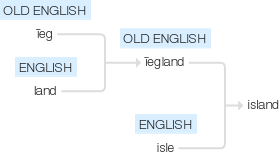Island
Old English īegland, from īeg ‘island’ (from a base meaning ‘watery, watered’) + land. The change in the spelling of the first syllable in the 16th century was due to association with the unrelated word isle.
wiktionary
From earlier iland, from Middle English iland, yland, ylond, from Old English īġland, īeġland, ēaland(“island”), from Proto-Germanic *awjōlandą (from Proto-Germanic *awjō(“island, waterland, meadow”), from Proto-Indo-European *h₂ekʷeh₂) + *landą(“land”), equivalent to ey + land.
Cognate with Scots island, iland, yland(“island”), West Frisian eilân(“island”), Saterland Frisian Ailound(“island”), Dutch eiland(“island”), Low German Eiland(“island”), German Eiland(“island”), Swedish ö(“island”), Öland(“Sweden's second largest island”), Danish ø(“island”), Norwegian øy(“island”), Icelandic eyland(“island”).
The insertion of ⟨s⟩—a 16th century spelling modification—is due to a change in spelling to the unrelated term isle, which previously lacked s (cf. Middle English ile, yle). The re-addition was mistakingly carried over to include iland as well. Related also to German Aue(“water-meadow”), Latin aqua(“water”). More at ea.
etymonline
island (n.)
1590s, earlier yland (c. 1300), from Old English igland, iegland "an island," from ieg "island" (from Proto-Germanic *awjo "thing on the water," from PIE root *akwa- "water") + land (n.).
The second syllable (also in Old Frisian alond, Middle Dutch eiland) was added later to distinguish it from homonyms, especially Old English ea "water" (see ea). As an adjective from 1620s.
Spelling modified 16c. by association with similar but unrelated isle. Similar formation in Old Frisian eiland, Middle Dutch eyland, German Eiland, Danish öland, etc. In place names, Old English ieg is often used of "slightly raised dry ground offering settlement sites in areas surrounded by marsh or subject to flooding" [Cambridge Dictionary of English Place-Names].
Island universe "solar system" (1846) translates German Weltinsel (von Humboldt, 1845). An Old English cognate was ealand "river-land, watered place, meadow by a river." Related: Islander.
